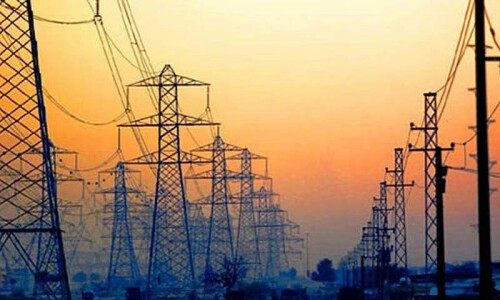PAKISTAN deserves a break from political turmoil — though that seems a pipe dream for the moment. The ruckus among the powerful appears set to continue. The nation holds its breath as important decisions are taken.
The PTI chief is poised to ‘invade’ Islamabad. If that were not as grave as it sounds, it would come across as an extravagant 21st-century canard. But it is manifestly not.
The former cricket superstar seems to be in all earnest as, having had groups of party workers swear allegiance to his ‘jihad’ and called for volunteers from across the country, he fulminates against his opponents at his mammoth public rallies.
The government too, for its part, is making sure that it is fully prepared to protect the federal capital in the face of what appears to be a slight departure from the ‘long march’ tradition in the country and gives the impression, instead, of being — at least as the PTI leadership would have it — an organised insurgency.
Protests on a whim ought to be seen for what they are.
While one waits for this theatre of the absurd to unfold, one cannot help wondering how supposedly responsible members of political society in Pakistan can countenance what would, at another time, have been unthinkable.
There are those who assure us that the planned march is in fact purely tactical and ought not to be taken too seriously. But — in view of the PTI chairman’s persistent and truculent threats — the government is clearly not taking any chances.
It is apparent that this is no ‘jihad’, as commonly understood, but a no-holds-barred bid for power — or tactical supremacy, as the case may be. That can of course — all too easily — get out of control and pose a hazard to the state.
Though it exists independently of any individual government, the state is inextricably tied in with government and its workings. Extravagant notions of freedom aside, what the PTI’s top leadership seems to be contemplating can consequently be said to constitute something like an assault on the writ of the state.
The army chief’s observations, at the annual passing-out parade in Kakul, to the effect that no political group would be allowed to destabilise the country — politically or economically — reassuringly took cognisance of that
At the same time, it makes perfect sense for the government to be in readiness for any challenge that might be sprung on it. What it is contending with is the more menacing for being — in keeping with the PTI leader’s volatile persona — entirely unpredictable.
The so-called jihad is of course ultimately a pure gamble with Khan, rightly confident of mass support, cleverly hedging his bets as part of his psychological warfare.
Protest rallies with a legitimate basis to them are of course of the essence in a democracy. But protests founded solely on the whim or will of a particular leader, determined to unsettle, if not dislodge, a perfectly legitimate government through a campaign of disinformation ought to be seen for what they are.
What we are witnessing in Pakistan today is precisely the spectacle of a vast segment of the population apparently hostage to a leader making a last-ditch stand as he fights, not for any lofty cause, but for his own political survival.
The PTI chief’s bid for power would have been a little more acceptable if it had been credible — and credibly pro-people — rather than based on self-interest. He is entirely justified in speaking of the need for corruption to be eradicated. But it is a fallacy to imagine that corruption can be removed with the wave of a magic wand.
Corruption in the country has, as we know, its roots in the existing social order and the vast gap between the rich and poor. That is an issue that obviously needs to be addressed — and not just because of being among the conditionalities of the IMF.
The concern, for the moment, is that, when former prime minister Nawaz Sharif returns from self-exile in London, it should be with an acute awareness of the extent of change that has come about in the country since 2019. He must come with his ear to the ground and a full knowledge of the facts and a host of new political nuances.
There is absolutely no gainsaying the fact that Imran Khan — whether due to his sophistry or their own ingenuousness — is popular among the masses. That is not, as some PDM leaders like to think, a mere myth.
It would also be fanciful to imagine that one cult can supplant another. For the time being, one presumes too that the focus of the people is — owing to the floods — necessarily elsewhere.
It is possible, however, that the return of the PML-N supremo may bolster the popularity of the PDM government as well as the morale of the people which is by no means at an all-time high. Steering a middle course — expectations duly tempered — seems like the best option for him for now.
The writer is the founder-chairman of Dialogue: Pakistan, a local think tank.
Published in Dawn, October 15th, 2022












































